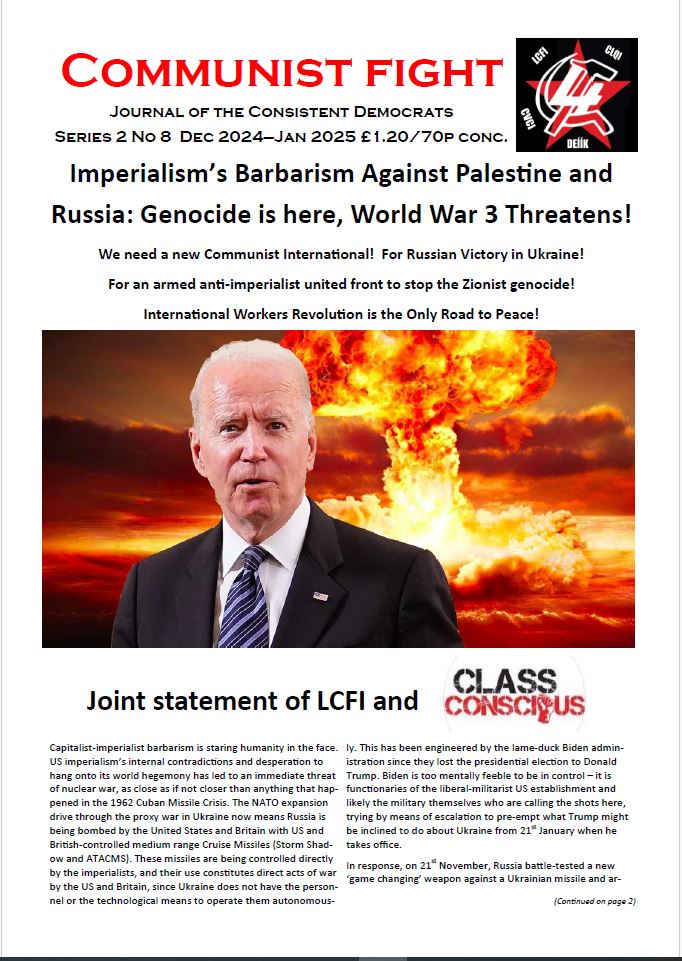The political crisis is exhausting the options available to the vassal bourgeois regime. President Yoon Seok Yeol tried to save himself by imposing a military coup (3/12) and hastened his downfall. Acting Prime Minister Han Duck-soo protected Yeol and was impeached. Now, the finance minister, committed to Yeol’s economic policy, is the hot topic. The role of the US on 3 December, to harden the regime against its own people and against North Korea, China and Russia.
We reproduce below the Second Declaration on the Struggle to Overthrow the December 3 Coup, published by the Bolshevik Group of South Korea on December 27, 2024
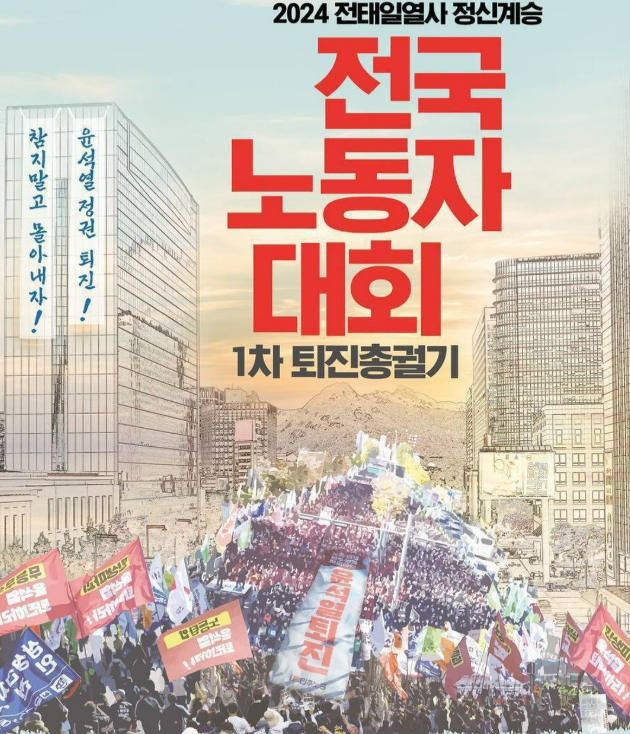
The December 3 military coup orchestrated by Yoon Seok-yeol, which abruptly froze our normal lives, has been thwarted for now. This was due to the swift actions of the Korean Confederation of Trade Unions (KCTU) on the front line, together with the courageous workers and citizens who rushed to the National Assembly to confront the martial law forces. They stopped heavily armored vehicles equipped with machine guns with their bare hands and engaged in physical confrontation with special forces armed with firearms and various lethal equipment. These heroic actions eventually created a situation of overwhelming resistance, leading to the National Assembly’s resolution to lift the emergency martial law.
Sweeping away the embers of conspiracy and the forces that support it
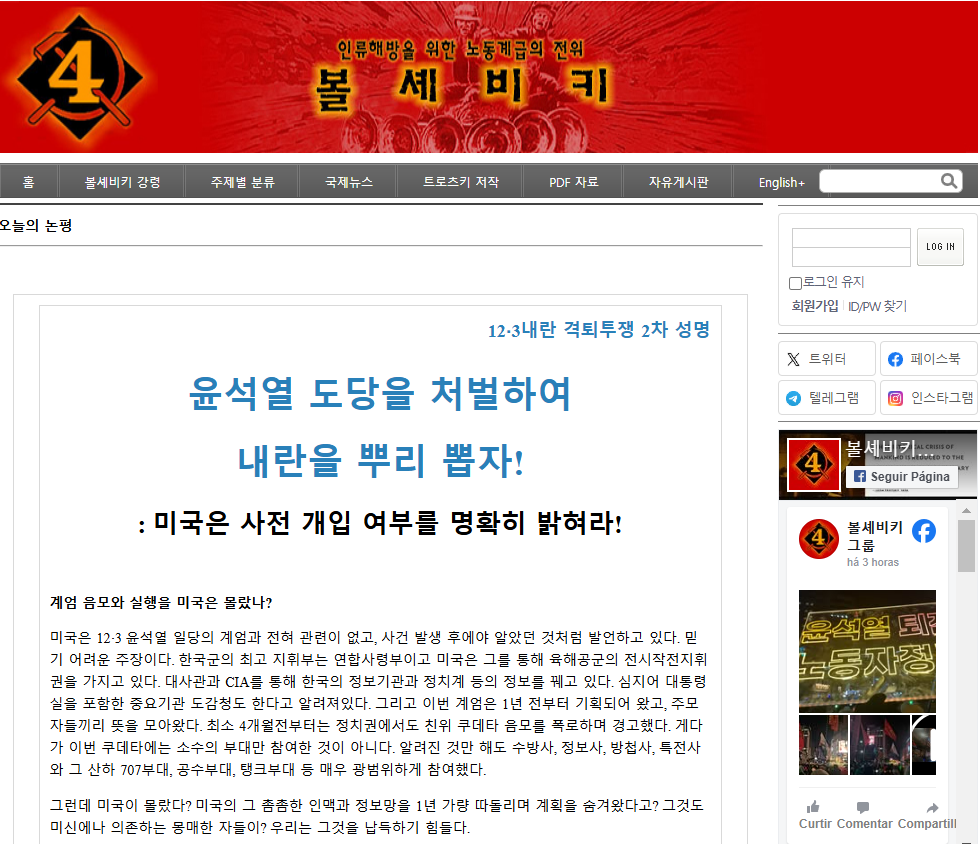
Punish Yoon Seok-yeol’s conspiracy
Eradicate the civil war against!
The United States must clearly indicate whether it intervened in advance of the conspiracy!
However, the flames of the conspiracy have not been fully extinguished. Although some of the main perpetrators of the coup have been arrested, its leader, Yoon Seok-yeol, still formally retains his position in the presidential office. Many of the plot’s masterminds, participants, and accomplices remain in their positions in the military leadership, the cabinet, the prosecutor’s office, the police, and the Corruption Investigation Office. Furthermore, reports (MBC, December 24) indicate that dozens of special agents mobilized for the coup have not been disarmed and have not yet returned to their bases.
To prevent a recurrence of the coup and ensure peace in our society, those who participated in the conspiracy using brutal weapons must be severely punished. Even Cho Gab-je, former editor-in-chief of Monthly Chosun and a mentor of the far right, stated, “The highest leader must receive the maximum punishment to prevent this from happening again.” This task is clear.
However, some are resisting the effort to fully reveal and punish the details of the coup. Some are passively delaying the process and trying to complicate matters in a critical manner. Others are actively obstructing the punishment of the coup participants, claiming that the legalist coup was a “legitimate act for governability.” A prime example is the People’s Power Party, a far-right party rooted in extreme regional disputes that has been exploited as an instrument of governance since the Park Chung-hee regime.
The strength of pro-democracy protesters
This is why we cannot be optimistic about the current situation. This is why we must go to the protest sites. In the 20 days since the coup, the number of protesters demanding punishment for the perpetrators of the plot has already exceeded several million. Protesters are braving the bitter cold, with temperatures dropping to minus 10 degrees Celsius, to participate in demonstrations. On the 22nd, they even stayed up all night in Namtaeryeong, where freezing winds bit their skin, to show solidarity with the farmer protesters who came on tractors.
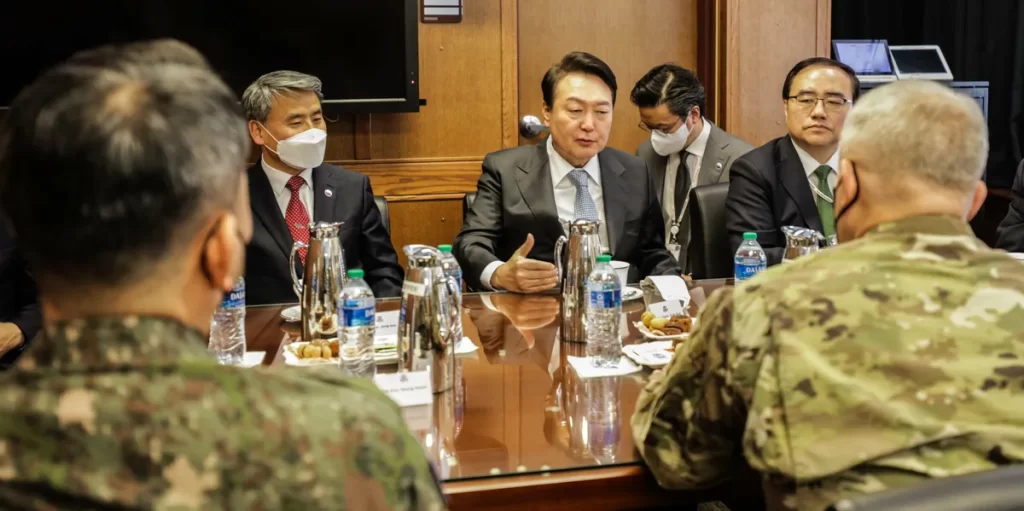
The political atmosphere is tense and solemn, but the protesters are bright and energetic. The protests, dominated by teenagers and people in their thirties, are full of energy. Sometimes solemn, but usually upbeat. K-pop, protest songs, candles and glow sticks of fandom come together in harmony, uniting as one. Most of the protesters were ordinary workers who lived their daily lives before the coup. Participants who enjoyed work, leisure, hobbies of “idol revival, games, etc.” and socializing were shocked by the crazy coup. They were outraged by how martial law suppressed their daily lives colored with dull steel gray. They gathered in the streets to protect their way of life. Ordinary people temporarily reserved their leisure time to courageously face the brutal violence that threatens social peace.
This force will not be broken. When the overwhelming majority of society comes together with this determination, the fight will never be lost. Even the most foolish will understand this.
Those who seek to tame the current of democracy
They seek to slow down the social ascension of the population against the coup and the regime that engineered it. Their aim is to tame the political current. A strong current could destroy the surface and reveal the true causes of social suffering. It could even reach the heart of power and wealth, long considered untouchable. Their mission, therefore, is to tame the current, slow it down and drain its energy. Their aim is to extend the course of the current and channel it into a path of their choosing in order to control it. This is how the massive candlelight protests of 2016-17 were finally controlled by the impeachment of March.
“We cannot oppose the direction of punishing treacherous criminals, including Yoon Suk-yeol, but we will minimize and restrict the scope and severity of punishment, to prepare for the future and protect our power and wealth intact.” This reflects the mindset of the coup plotters, accomplices and sympathizers.
Currently, Prime Minister Han Duck-soo appears to be at the forefront of this process of trying to control the current. After the impeachment of Yoon Suk-yeol was approved by the National Assembly, Han, who is serving as acting president, has been delaying proceedings to hold the coup leaders accountable. Yeongnam’s far-right People’s Power Party (PPP) is protecting him.
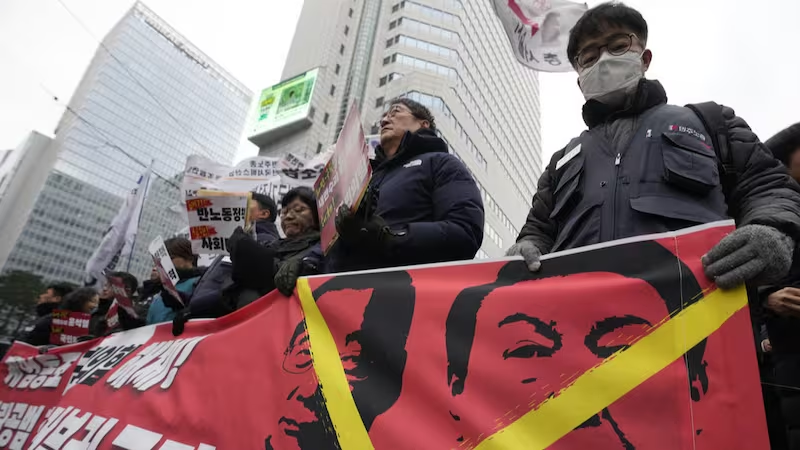
The role of the United States
It is not just the People’s Power Party that is seeking to tame the current using Han Duck-soo. The United States is also involved. Deputy Secretary of State Kurt Campbell said at an Asia-Pacific press conference in Washington, DC, on the 19th, “We support the transitional role of Acting President and Prime Minister Han Duck-soo.” US President Joe Biden also reportedly told Acting President Han in a phone call on the 15th, “I know you very well and I trust you completely.” (Chosun Ilbo, December 21, 2024)
This intention was soon communicated to the Korean political sphere. U.S. Ambassador Goldberg met with Democratic Party leader Lee Jae-myung and People Power Party leader Kweon Seong-dong on the 23rd to convey the message. Ambassador Goldberg stated, “The common goals of the United States and South Korea will be prioritized in collaboration with Acting President and Prime Minister Han Duck-soo and the Korean government.” This statement came at a time when efforts to impeach the sitting president were underway. Sitting humbly like a classroom monitor summoned to the teacher’s office, Lee Jae-myung bowed his head, stating:
“Not only South Korea-U.S. relations continue, but also cooperation between South Korea, the U.S. and Japan.”
Thus the human current slowed as if the brakes had been applied. On the 24th, the Democratic Party, which declared:
“The investigation into the coup cannot be compromised. Acting President Han’s remarks are aimed at prolonging the coup. We will immediately initiate impeachment proceedings against him,”
changed his position, stating:
“We have decided to be patient and see if the appointment of the Constitutional Court judges on the 26th and our demands are met, taking into account the feelings of the people.”
What sentiments did the Democratic Party consider? Although it is not clear whose heart they had in mind, it is certain that the US and the People Power Party intend to slow down the current.
Where is the Democratic Party headed?
The Democratic Party is caught between two opposing forces in the aftermath of the December 3 coup. On the left, there is pressure from tens or hundreds of thousands of citizens and workers who are demanding the punishment of Yoon Suk-yeol and other coup participants, while also advocating the National Assembly resolution to lift martial law. On the right, there is pressure from US imperialism, which holds hegemony over the capitalist system in South Korea, together with local capital and its far-right proxy, the People’s Power Party (PPP).
On December 16, the Democratic Party balked, stating:
“We will not proceed with the impeachment of Premier Han. We will establish a National Stability Advisory Body.”
However, so far it has been driven largely by strong pressure from the left to move towards “repelling the coup and defending democracy”.
However, the expansion of democracy ultimately threatens the dictatorship of capital. Thus, the Democratic Party will ultimately stop the democratic struggle. This will betray the cause of democracy.
On December 27, at 4:30 p.m., the Democratic Party voted to impeach incumbent President Han Duck-soo. This was the result of giving in to pressure from millions of protesters. With this, the fight to repel the December 3 coup has advanced one step further.
At the Top of the Food Chain: US Imperialism
The relationship between South Korea and the United States is not one of equals; it is hierarchical. The United States defeated Japan during World War II, a war of imperialist rivalry, and became the ruler of South Korea. With its role and influence in South Korea’s economy, establishment and control of the military, networks of political elites, and British-centered cultural dominance, imperialist America sits at the apex of the food chain in South Korean society.
The US extracts huge surplus profits from South Korea, as was clearly demonstrated during the 1997 IMF crisis. In addition, South Korea serves as a front line against Russia (the former Soviet Union), North Korea, and China. Along with Japan and Taiwan, it is a strategic stronghold of US imperialism. Pyeongtaek hosts the largest US military base in the world, and the commander of US Forces Korea also serves as the commander of the Korea-US Combined Forces Command, which has military operational authority. Through various channels such as the embassy, the CIA, and NGOs, the US maintains a dense network of relationships, gathering information in real time. With this power, it exerts decisive influence not only on the economy and the military, but also on politics, education, the media, and culture.
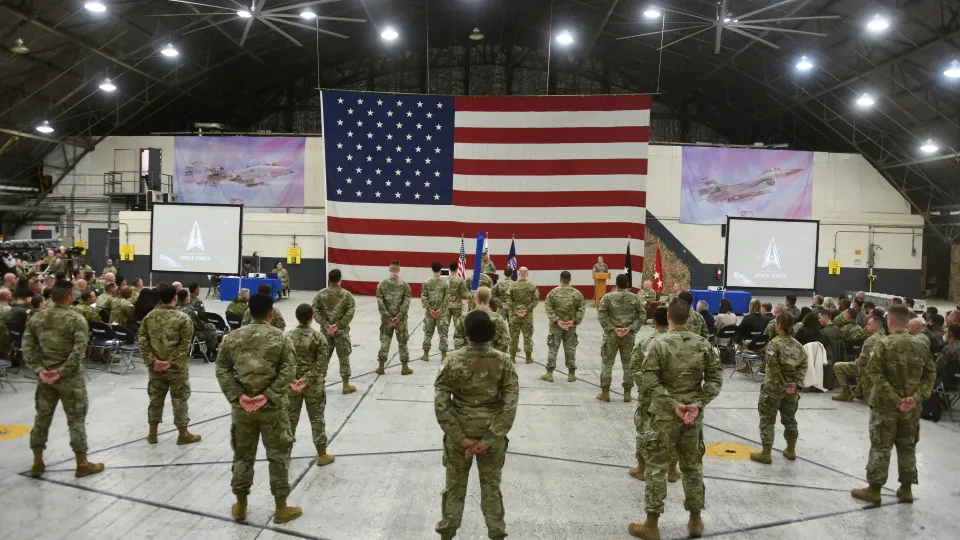
Didn’t the US know about the conspiracy and execution of martial law?
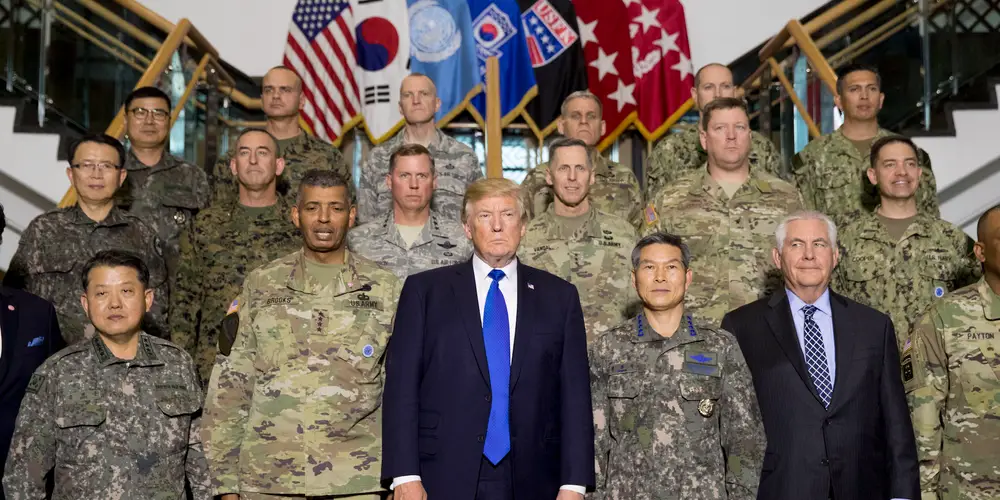
The US claims to have had no involvement in the December 3 martial law declared by Yoon Seok-yeol and his faction, saying that they only became aware of the incident after it occurred. This is a claim that is hard to believe. The highest command of the South Korean military is the Combined Forces Command, and the US holds wartime operational command through it, overseeing the Army, Navy and Air Force. Through its embassy and the CIA, the US also collects information from South Korean intelligence agencies and political circles. It is even said that the US is conducting surveillance on key institutions, including the Presidential Office. Furthermore, this martial law was planned a year in advance, with the plotters lining up their intentions. At least four months before, there were warnings about the coup plot in the political sphere. Furthermore, this coup was not limited to a few units – known participants included the Defense Security Command, the National Intelligence Service, the Defense Security Command, the Special Warfare Command, along with their subordinate units such as the 707th Special Mission Group, airborne units, and tank units, all of which were extensively involved.
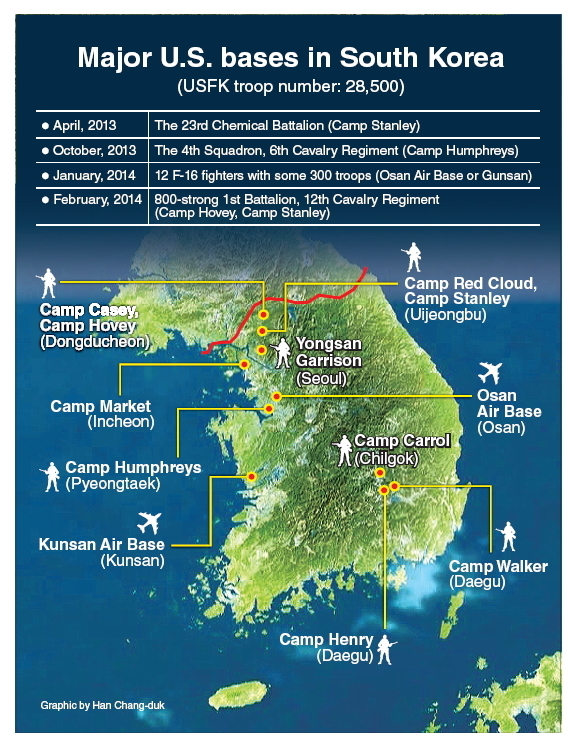
But didn’t the US know? Are we to believe that this plan was hidden for almost a year, avoiding detection by the extensive US networks and information channels? And that it was done by ignorant fools relying on superstition? We find this hard to accept.
We believe that the relationship with the US should be included in the investigation of the coup and uprising. Did the US really not know? How could it not know? If it knew in advance, why did it not prevent it? Could it have been involved in the conspiracy, or perhaps knowing the plans, it simply let everything happen, turning a blind eye? This must be clarified. This is a crucial task to identify the origins of the current situation and prevent future recurrences. After all, the US has historically been involved in military coups in colonies, including those of Park Chung-hee and Chun Doo-hwan, ever since the US gained global hegemonic power.
– The working class must take the lead and immediately remove and punish the coup leader Yoon Seok-yeol and his entire faction!
– Even if we have to make the same mistake again, we will force Yoon Seok-yeol to resign!
– Politicians, including those from the Democratic Party, are not the solution to the problem, but just another set of figures responsible for changing roles. We must reject any illusions about capitalist politicians!
– Let us be careful with the brakes that the Democratic Party is putting on the flow of the fight for democracy!
– The US must clearly clarify whether it knew in advance about the December 3 coup!
– The root of the problem is ultimately capitalism. Let’s establish a workers’ government!

